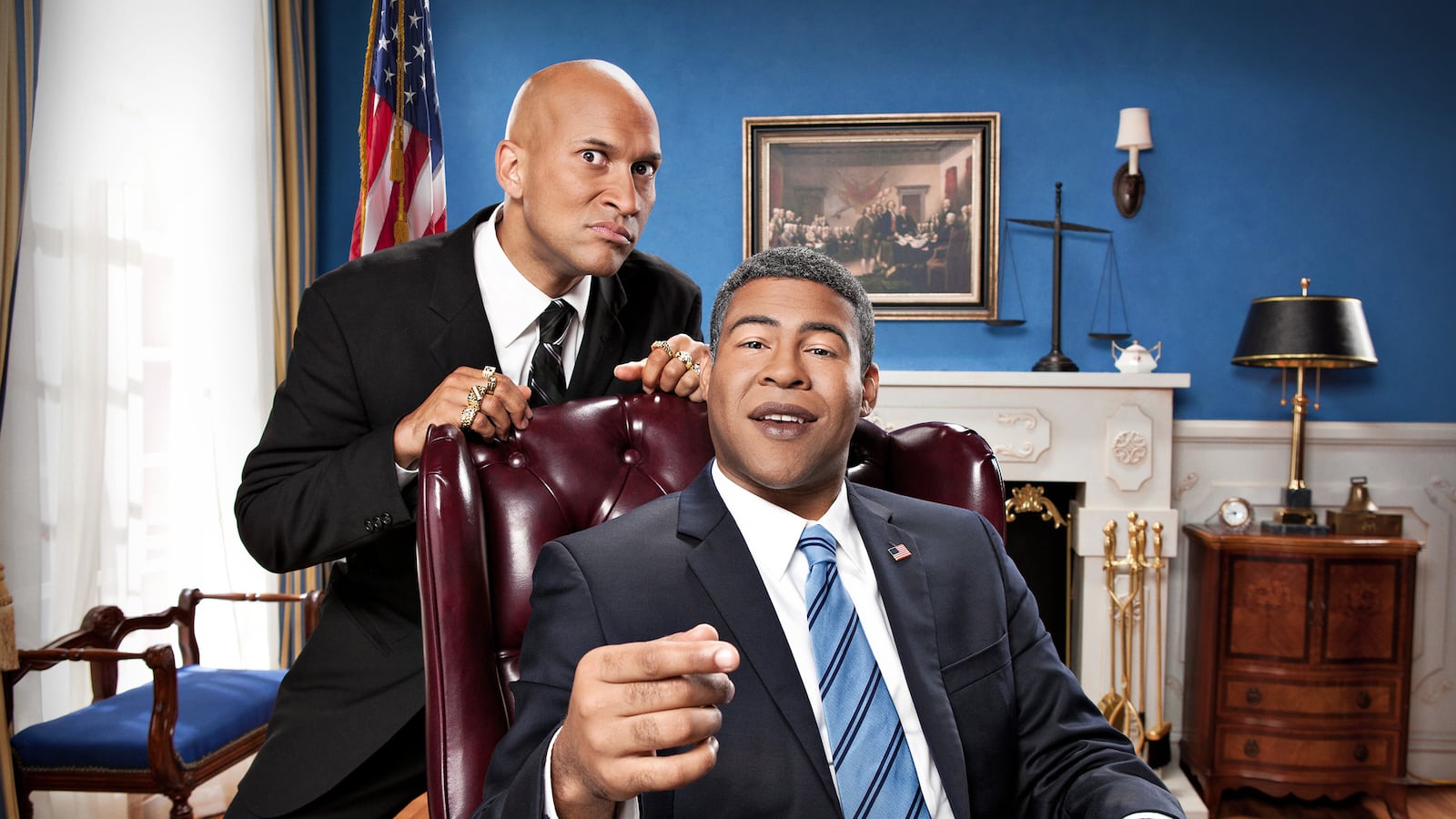
“I’m a f--king baseball player, that’s what we do. We f--king hit home runs and f--king slap-ass.” The line is from Comedy Central duo Key and Peele’s hilarious sketch “Slap-Ass.” The premise: an intervention for a man who is addicted to, well, slapping ass. But what are we laughing at? Is it because the biracial comedians seamlessly slip into the characters and skewer racial stereotypes? Or are we laughing at people from the Dominican Republic? Or is the repetition of the phrase “slap-ass” just funny? Does it matter?
Hailed as the successor to Chappelle’s Show, Key and Peele averages nearly 2 million viewers a night. (“Slap-Ass” has more than 2 million views on YouTube; “East/West College Bowl,” the video that perhaps launched their virality, has 20 million.) The guys are co-producing and co-writing a movie with comedy guru Judd Apatow, who says Key and Peele can make “the movie that America desperately needs right now.” (Read: a grown-up comedy about race.)
Yet, for two comedians who think the idea of race is absurd, Keegan Michael-Key (the tall bald guy) and Jordan Peele (the short guy) sure do talk a lot about it. The ex-Mad TV cast members came out proudly as biracial in the first episode of their show. They say that if Obama weren’t elected president, they probably wouldn’t be on television right now.
“We’re ostracized more,” says Peele, in his self-described voice of a Def Comedy Jam comedian doing an impression of a white guy. “There’s both black and white people who hate us for being black or white.”
“This might get me in trouble,” Key says, animated like a preacher. “But I believe that if you’re African American, not mixed, and you code-switch, you may think you’re selling out or you feel uncomfortable. For me and him, code-switching has always been just part of our lives. If you’re black, you may feel like you’re betraying your blackness. We’re only half black.”
The comedians speak about their craft like professors, dissecting scenes into specific frames, repeatedly referencing code-switching, or alternating between dialects in conversation (sounding “harder” around black people; talking like Wayne Brady in front of white people). “We laugh at Daffy Duck because he’s a craven coward,” Key says, completely seriously, while explaining why primal behavior is an infinite source of humor.
Their sketches tease the many shades of black masculinity: A black substitute teacher mispronounces names at a white suburban school; an anger translator for President Obama; an athlete who just hit the game-winning shot says that kids can do anything, unaware of the difference between the words “literally” and “metaphorically.” There are a few sketches in which the duo actually play white people: in the excellent “Meegan, Come Back,” Peele, dressed in drag, proudly proclaimes, “I’m over it!”
The New Yorker’s Emily Nussbaum says that the duo’s biracialism is “a Golden Ticket to themes rarely explored on television.” Perhaps this is true, in the sense being biracial lets the comedians fit into their characters; trying to fit in is, they say, what they’ve been doing their whole lives. Yet, most viewers probably don’t actually know that Key and Peele are biracial. Instead, they’re just really, really funny.
***
The problem with “race-transcending” comedy is that some will argue that it’s just a way to justify making fun of a race. In a scathing critique titled “Key and Peele’s edge-less post-racial lie,” Salon’s Kartina Richardson said the comedians fail to address the real violence of racism. “The only sketches that are explicitly about racism are historical and the only racists in the first few episodes are Nazis and slave owners. This makes the black characters seem like fools and the result is a show that makes fun of blacks in a way white liberals will allow themselves to enjoy, under the guise of ‘talking about race.’”
Consider sketch comedy about slavery. A few weeks ago Saturday Night Live aired a failed skit called “12 Days Not a Slave,” in which a freed slave played by Jay Pharoah doesn’t understand why white men don’t welcome him into society. The unfunny refrain: “It’s been two weeks!” Here, the black character is a buffoon. The jokes hinge on stereotypes: black people like curvy women and know how to get down on a dance floor.
Yet in Key and Peele’s “Auction Block,” two slaves up for sale complain about why no one wants to buy them. “We’re not equipped, physically, emotionally, vanity-wise with any of the fortitude to go through what our ancestors had to go through in that situation,” says Peele of the skit. “We’re not really doing any dialect, but playing off our weak-ass selves.”
“We look at tabloids and go, ‘What a shame everybody’s talking about the Kardashians. Who cares? There’s people starving in the world,’” says Key. “Yet we keep buying those magazines. Your life in slavery is just about to begin and you’re concerned about why they picked the skinnier guy? I think it makes a very big 21st-century comment.”
But what if the audience isn’t in on the nuanced 21st-century comment? That is, what if white middle class viewers are laughing for a different reason?
To answer this, it’s worth examining the “East/West College Bowl,” which makes fun of the names of (predominantly black) college football players. Peele says the sketch is a celebration of unique black names. “If you are going to judge it from a racial standpoint, you’d say, ‘Oh man, so wait, all black people have crazy names?’” he says. In an interview with NPR, he went deeper, touching on the history of African-Americans having names taken away and being renamed. Will names like Hingle McCringleberry and Davoin Shower-Handle universally elicit deep thoughts about slavery? Probably not. Key and Peele know that.
“The question that really keeps me up at night the most is what about that one black guy who’s in an all white town, and he’s at a bar,” says Peele. “And what if one of our sketches comes on that pokes fun at a part of the African-American culture and he’s already in an environment where he’s the butt of the joke? The ultimate mission is to cure that very phenomenon.”
“My hope would be that the dialogue at the bar would be like, ‘Well Darnell, does that happen?’” says Key. “I would love for Darnell to go, ‘Well aren’t you afraid of your wife?’ Men are afraid of their wives. That’s a human thing. Black men aren’t afraid of their wives in a different way.”
This, of course, means that no one is safe. In “Insult Comic” a comedian makes fun of an obese man and a lady with a large bosom in the audience, but then awkwardly skips over a man who’s severely burned. “Do me,” the man says in a robotic voice. “Make fun of the burns.” When the comedian acquiesces and makes a Freddy Krueger joke, the audience turns on him.
“He said he could take it! That’s what he said!”
“I thought I could, but I can’t.”
“How is this on me? How do we even know if he’s crying right now? I don’t know that sound. It just sounds like an electronic sound.”
“The tears…they burn.”
The sketch illustrates Key and Peele’s mantra: choosing not to ridicule something is a form of bullying. The sketch also ends with an angry audience member smashing a bottle on the comic’s head. Daring comedy is fine, as long as it’s funny.






